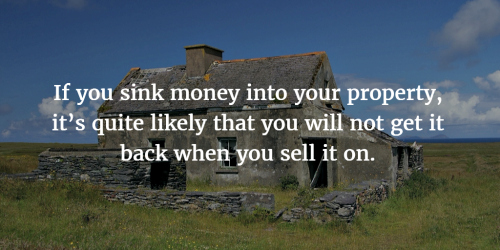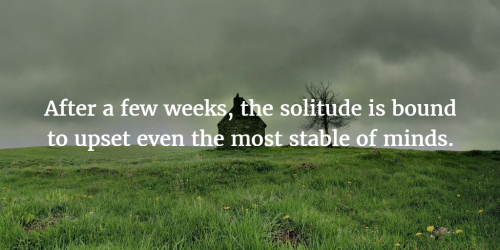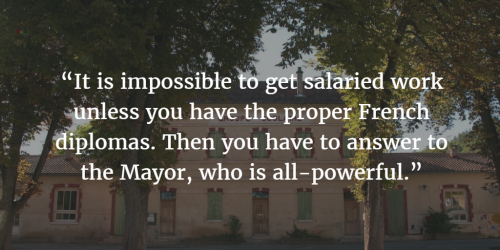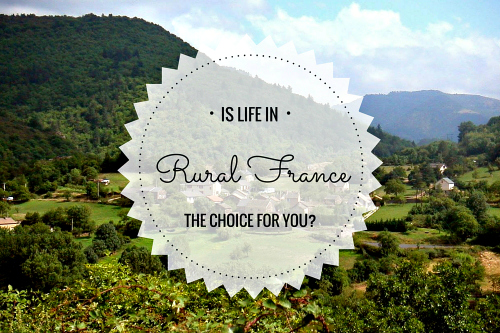Romantic wannabe expats who have read A Year in Provence or watched Chocolat one too many times may be swept away with the daydream notion of moving to rural France.
The French countryside is a gorgeous place to be; from the hedgerows of the Normandy farmland to the rugged Alsace and the gently rolling hills of Champagne. As the second largest country in Europe, behind the Ukraine, France enjoys a wide variety of landscapes within its 644,000 square kilometres.With 66 million residents, the country has a population density of just 111 people per square kilometre, less than half that of the UK.
That average figure doesn’t reflect just how peaceful the countryside is. The magnetic pull of Paris means that 2.2 million Frenchmen call themselves Parisian and the remaining cities lay claim to a significant proportion of the remaining citizenry. This leaves the villages and hamlets that dot the landscape with a handful of people to fill their census.
Indeed the pull of cities has long been a problem that besets the French state, with much of 20th century politics dominated by the issue of rural flight. The migration to the cities has been slowed in recent years by invading troops of expats. Brits particularly are seeking their own slice of the French countryside.
Attracted by the quality of life enjoyed in France, with high standards of public healthcare, schooling, life expectancy and civil liberties, expats are heading to France in their droves.
There’s an estimated 500,000 British citizens living in France, with the rate of new arrivals doubling since the financial crisis of 2008. Certain areas are more popular than others, with the town Eymet, Dordogne now counting a third of its population as British born.
But living in rural France isn’t all brie and fresh baguettes. It can be a tough old slog to deal with red tape, language barriers and a lack of services.
The countryside in France is so sparsely populated that some settlements consist of only a handful of houses, so the chance to meet new people and enjoy a thriving social life is limited.
So it’s hardly surprising that, after the weather, the most important factor Brits cite when choosing a place in France is living in an expat community. Joanna Leggett, an estate agent based in France, said “people often say that they don’t live want to live in an area with other Brits, but actually they do.”
“When they get to their new home,” she told thelocal.fr, “they realise it’s mostly English speakers who help them out when they need it and it’s the other expats that give them support.”
Whether you’re looking for a British enclave in your French fantasy, or to dive into the joie de vivre, make sure you know what you’re getting into.
Beware of money pits
As a rule, the French don’t invest in ‘do-er up-ers’. Tumbledown farm buildings are left to tumble to the ground whilst the smart money goes to more sturdy accommodation elsewhere in the country. That means the prices on these abandoned structures have fallen too, making them an enticing bargain for the savvy shopper.
Expats excitedly snap up these renovation projects, hoping to style a caved-in pig shed into their dream chateau. Many have succeeded in doing just that, but others have run into a mire of red tape, angry locals and financial difficulty.

France has a strict set of planning regulations that are enforced with zeal, and taxes are in place to prevent the property market becoming a money making scheme. Local, national and windfall taxes mean that if you sink money into your property, it’s quite likely that you will not get it back when you sell it on.
Nigel Perry, a Brit living in Herce, bought the ruin of a house for just GBP £8,700 in 2000 and patiently renovated it over the course of six years. He advises careful research and budgeting when setting out on any grand schemes. “We hear so many stories of Brits, who come out here having done no homework at all,” he told thelocal.fr, “thinking that they can ignore all the regulations; pretending they are still living in UK; avoiding local, and income taxes; paying for work on the black; and then they wonder why they can’t sell their houses without a huge tax bill, because they have no proof of expenditure, or guarantees.”
Sleepy village centres
Expats are drawn to cheap house prices, many are seduced by a bargain offer on an old farmhouse complete with outbuildings and a small patch of land. The downside of this apparent serenity is that the nearest shopping street may be just as peaceful.
There may be a few stores selling basic supplies to keep your cupboards stocked, but you may not be lucky enough to find them open. Even city-dwelling French people are exasperated to find country shops closed up on Sundays.
Many stores also stay shuttered up on Mondays too, and a few won’t open on Tuesday either. Even on days when the doors are open, they may close again unexpectedly for lunch or any reason the owner fancies.
Get used to a lack of choice as each shop is likely to carry only a small range of products and the nearest alternative merchant maybe several villages away.
Everything in rural France runs a bit slower, including the postal service. Post boxes may be emptied every other day and deliveries may be just as infrequent. Should you need to visit the post office for any reason, expect them to keep the same unpredictable hours as the butcher and the baker.
Get used to keeping the house properly stocked with spare provisions and going for a regular large grocery shop to the nearest supermarket. Whilst ‘nipping to the shop’ might entail a few hours of your day, it will be the only ways to get everything you need.
Lonely in paradise
You may have travelled to escape the madness of a big city, finding peace in a remote cottage among the vineyards. But now you may be wondering why nobody pops round to visit.
Many bargain properties in rural France are in small hamlets or utterly out on their own, with only chirping crickets and a bottle of wine for company. You may feel like the sole survivor of a cataclysmic event, the only person left on earth.
This may be what you think you are looking for, but after a few weeks, the solitude is bound to upset even the most stable of minds. Even if you do have neighbours, you may not be welcomed immediately as part of the community, and a surprisingly high rural crime rate can make to feel even more isolated.

Melanie Jones moved to a remote corner of France with her husband and children before returning to the UK. She told the Telegraph that after four years “my disillusionment with “living the dream” was growing,” she writes. “It wasn’t that we hadn’t adjusted to a different sort of life, it was just that life wasn’t actually that different. I was still a slave to the clock, still doing the long school run. We had lovely neighbours, but found no real sense of community and were burgled twice.”
Learning the language
There’s an unkind rumour about the French, that they are perfectly fluent in English but refuse to make life easy for visitors. True or otherwise, expats should accept that living in another country means accepting that you aren’t at home any more, so get used to speaking French.
Joanna Leggett told thelocal.fr that many expats browsing for a new home in the French countryside underestimate the need to practice their patter: “I say to them, do you speak French? And they’ll often say they will pick it up but they don’t realize how hard it is to learn another language, especially when you’re older.”
One expat living in Normandy told how he attempted to buy his morning bread with gestures and English. The woman in the bakery refused to serve him until he broke out his schoolboy French. Now he has to endure a lesson in conversational French every morning before she will hand over a baguette. As inconvenient as this may be to a hungry expat, it’s also fair. Respect the local pride in their language and make the effort to talk to your neighbours in their tongue.
There’s no excuse for not picking up the basics; classes are readily available and free language tutoring apps are just as effective. Read Asterix comics in their original French and work your way up to Sartre.
Expensive cost of living
Products are expensive, taxes are high and pop up on all sorts of things.
The UK is the fifth most expensive place to live in Europe, and whilst France sits in 10th place, other expat favourites Italy (13) and Spain (18) fare much better.
Taxes pile up on big purchases like cars and property, whilst extra permits and licences for building or running a business can also add up. Expats need also be aware that just living in France is taxed by taxe d’habitation.
Get used to driving
There is no such thing as a ‘one-stop-shop’ in rural France. Buying milk, bread, a newspaper and some painkillers will involve a trip to four different shops and these might not even be in the same village.
To see an optician, buy shoes or get a suit dry cleaned may involved hours of winding through country lanes to find the right shops and hoping that they are open. It’s not just buying goods that require you to burn rubber; schools are also spread out and entertainment is sparse.
It wouldn’t be too awful if you had transport options, but buses are a rarity and trains rarely connect to anything smaller than a large town. Melanie Jones found this in particular impacted her teenage children. “We had moved to give the children more freedom and independence, yet the lack of rural transport meant they actually had less,” she told the Telegraph. “They couldn’t get a bus into town to meet friends, or go to the cinema, although it was only 14 miles away.”
The cost of covering these miles will quickly add up, “I practically lived in the car, running up over 20,000 miles a year.”
It’s a lot of work
Your friends at home will all jealously covet your life spent sipping wine and sampling cheese whilst watching the sun set over your estate.
Of course, you may need to work in order to keep yourself afloat, which comes with its own issues, as Maria-Louise Sayer told the Mail Online. “It is impossible to get salaried work unless you have the proper French diplomas,” she said. “Then you have to answer to the Mayor, who is all-powerful in every French village and town.”

On top of that you’ll be travelling around the town to keep the cupboards stocked, to take the kids to school and run little errands. Then when you get back there may be DIY to do on your two-hundred-year old farmhouse or acres of grass to cut on your land.
Many expats report their surprise at how much work they have to put in to maintain their lifestyles. Don’t bite off more than you can chew.
Poor connectivity
Many expats dream of being able to enjoy a slow-paced rural life whilst holding down their high-paying jobs and working from their picturesque home.
Frustratingly, much of France’s countryside had limited connectivity. You may find yourself stuck in a digital black hole, unable to hook up to high-speed ADSL internet lines and with no mobile data.
Many French towns have 4G and 3G data coverage, allowing data-hungry expats to log on using internet dongles. These clever devices didn’t really catch on in better connected countries, but simply plugging one into to a laptop USB port allows the user to get online.
If you can’t live without the internet, satellite connections offer a costly but reliable service. This could be your only chance of getting online if you live far from the nearest telephone exchange, as greater distances degrade the signal.
Poor schools
Like many government funded services in the countryside, schools are few, far between and often not that great.
Melanie Jones told the Telegraph, “The children’s school was depressingly under-resourced, and the education proscribed and inflexible.” It’s not only the school that you may be disappointed in; the local mayor has the final say over where your kids get taught.
The official will issue a Certificate d’Inscription, which is your little one’s ticket to a school place. You can argue all you want to send your kids to a better school in a large town, but he can insist that they go to the underperforming village school.
Youngsters joining the French education system without a grasp of the language have very different experiences. Some are left to fall behind as school authorities shrug their shoulders, other pupils thrive as individual teachers work extra hard to bring them up to speed.
Far from medical services
Public healthcare provision in France may be the best in the world, offering a high standard of care from womb to grave for all who pay the mandatory health insurance.
But, as with all other services, medical care is set up to cater to population centres. If you need an operation, scan or specialist appointment, you’ll be travelling quite a distance.
Emergency coverage can also be sparse. The national ambulance service is often the second emergency service to arrive as fire fighters (sapeurs-pompiers) are also medically trained.
The biggest issue for rural expats is finding a general practitioner. The country as a whole is looking at a shortage of physicians and the countryside is bearing the brunt. As with most services, be prepared to travel.
Have you lived in rural France? Share your experiences in the comments!
Article by Andy Scofield, Expat Focus International Features Writer

